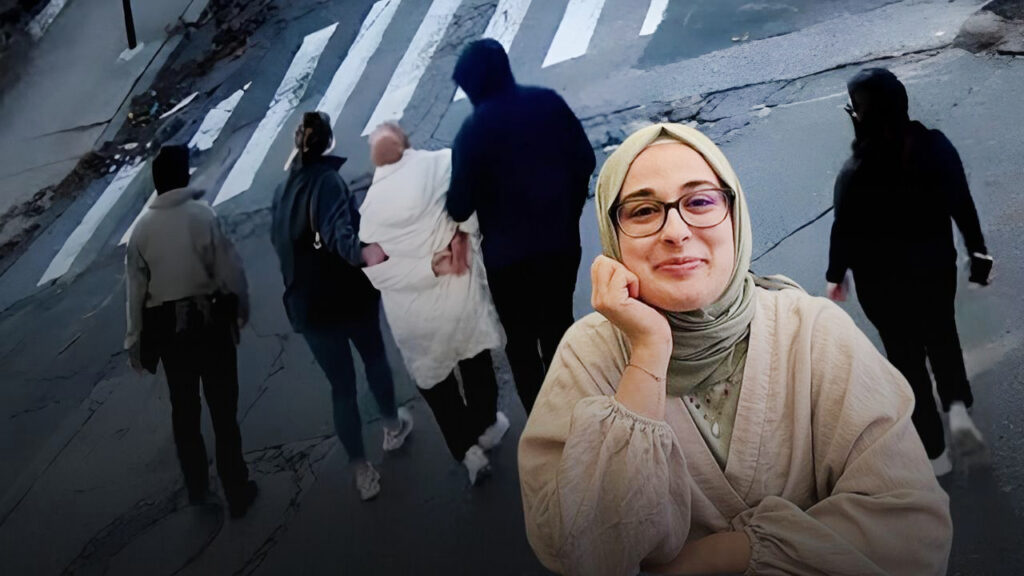Lawyers representing Turkish doctoral student Rümeysa Öztürk, detained by US immigration agents last month, are seeking her release from detention as she appears today at a hearing in a Vermont court, according to US media.
Öztürk, a Fulbright scholar, was arrested and physically restrained by immigration officers near her apartment on March 25, close to Tufts University’s Somerville campus, where she was a PhD student in child and human development.
She is one of hundreds of students studying at American universities whose visas have been revoked or stopped from re-entering the United States after they were accused of publicly expressing support for Palestinians.
The Trump administration revoked Öztürk’s student visa on March 21 but did not notify her before her arrest, records show.
She was first moved to New Hampshire, then Vermont, where she was held overnight, and then to an ICE detention center in Louisiana.
She is currently detained at a federal detention center in Basile, Louisiana, where the US government argues her case should be heard.
Her case is being heard at the Vermont District Court today.
A US Justice Department lawyer argued during the hearing that the presiding judge had no authority to weigh in on Öztürk‘s detention, which is pending before the separate immigration court system, according to the Boston Globe.
“She was taken into custody because of her absence of [student visa] status” after it had been revoked days earlier, said Assistant US Attorney Michael P. Drescher during Monday’s hearing.
He said the proper forum for Öztürk to seek release on bond is the immigration court system, where her removal proceedings are pending.
“Congress has made pretty crystal clear … that’s the case,” Drescher said.
But Judge William K. Sessions III noted that Öztürk is alleging constitutional violations of her First and Fifth Amendment rights, issues normally under the purview of the federal district court.
“But what is really fundamentally a question for me is, what if she is right?” Sessions said from the bench. “What if there was a constitutional violation in her arrest?”
He said if he was to find that her arrest was unconstitutional and ordered her release, only for the government to say, “‘Oh no, she can’t be released because we have a detention order in immigration [court], which is inviolate and she’s not going to be released,’ then we’re in a constitutional crisis.”
Drescher said the government would comply with any court order.
In an affidavit the student filed through her lawyers, Öztürk, 30, said she had been living in fear since February, when Canary Mission, an anonymous website purporting to expose “people and groups that promote hatred of the USA, Israel and Jews,” publicly identified her online along with more than 1,800 students at universities across the United States and Canada.
Öztürk wrote in the affidavit that she believed she was being abducted by people who wanted to harm her and feared for her life as she was transferred out of the state.
“I thought this was a strange situation and was sure they were going to kill me,” she wrote in the affidavit.
Öztürk said she experienced multiple asthma attacks during her journey from Somerville to Louisiana and made multiple requests to speak with her attorney that were denied, according to the affidavit. She spoke to her lawyer for the first time more than 24 hours after she was apprehended, the affidavit said.
Öztürk’s attorneys allege that she was targeted for taking a public pro-Palestinian stance last year when she co-authored an op-ed in the university’s student paper, criticizing Tufts’ response to the pro-Palestinian movement and calling for the school’s divestment from Israel.
Meanwhile, the US State Department determined that the Trump administration had not produced any evidence showing that Öztürk engaged in antisemitic activities or made public statements supporting a terrorist organization, as the government has alleged, days before the student’s arrest, according to a report in The Washington Post on Monday.
The finding, contained in a March memo that was described to The Post, said US Secretary of State Marco Rubio did not have sufficient grounds for revoking Öztürk’s visa under an authority empowering the top US diplomat to safeguard the foreign policy interests of the United States.
The memo, written by an office within the US State Department, raised doubts about the public accusations made by the Trump administration as it has sought to justify Öztürk’s deportation.
The US Department of Homeland Security has said Öztürk engaged in activities “in support of Hamas,” the Palestinian militant group recognized as terrorists by the US, but neither that agency nor US prosecutors have provided evidence for that claim.



